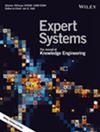Fuzzy Particle Filtering Based Approach for Battery RUL Prediction With Uncertainty Reduction Strategies
Abstract
This paper proposes a two-stage framework that combines uncertainty reduction and predictive modelling to enhance the accuracy of battery Remaining Useful Life (RUL) prediction. In the first stage, a simplified fuzzy optimization learning model is introduced to mitigate uncertainty caused by abnormal capacity fluctuations in battery data. The proposed fuzzy model reconstructs degradation data into a consistent downward trend based on mid- and short-term tendencies of the battery, alleviating abnormal variability and improving suitability for predictive modelling. In the second stage, uncertainty arising during the recursive prediction process of a standalone Transformer model was mitigated through the integration of a particle filter. This approach dynamically manages prediction errors using particles, effectively controlling cumulative errors and enhancing the stability and reliability of long-term predictions. This methodology can lead to extended battery life and increased operational reliability through accurate RUL prediction. The proposed methodology is validated through experiments using NASA and CALCE battery datasets, demonstrating superior prediction accuracy and stability compared to conventional approaches by systematically reducing uncertainties.

 求助内容:
求助内容: 应助结果提醒方式:
应助结果提醒方式:


